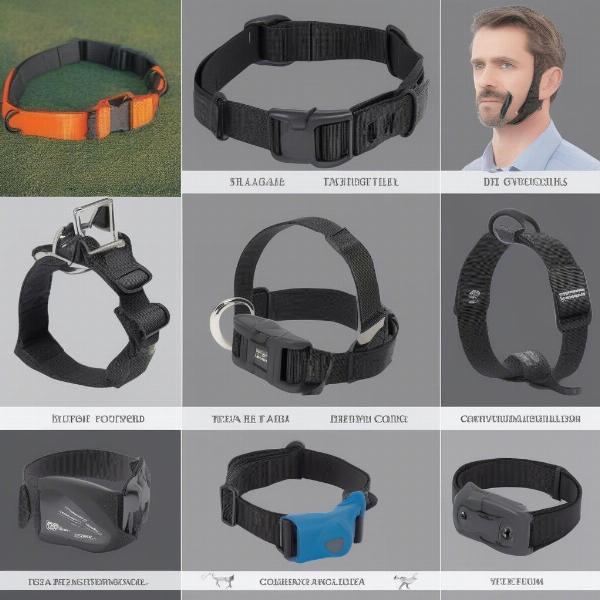Dog shock collars, also known as e-collars, are a controversial tool used in various dog training contexts, including hunting. Understanding their function, proper usage, potential risks, and ethical considerations is crucial for any hunter considering this training method. This guide will delve into the world of dog shock collars for hunting, offering a balanced perspective to help you make informed decisions.
Understanding Shock Collars for Hunting Dogs
Shock collars deliver a mild electrical stimulation to a dog’s neck via a remote control operated by the handler. The stimulation levels are adjustable, ranging from a slight tickle to a more intense sensation. The purpose is to interrupt unwanted behaviors and reinforce commands from a distance. In a hunting context, this can be useful for recall training, preventing chasing unwanted game, and maintaining control in challenging environments.
Choosing the Right Shock Collar for Hunting
 Different types of shock collars
Different types of shock collars
Not all shock collars are created equal. When choosing a shock collar for hunting, consider factors like the dog’s size and temperament, the terrain you’ll be hunting in, and the specific behaviors you’re addressing. Features like adjustable stimulation levels, range, waterproof capabilities, and tone or vibration options are essential to look for. A collar that’s too powerful for your dog can be harmful, while one that’s too weak might be ineffective.
Training Your Hunting Dog with a Shock Collar
Using a shock collar effectively requires careful planning and consistent training. Start with the lowest stimulation level and gradually increase it only if necessary. Pair the stimulation with a verbal command so the dog learns to associate the two. Never use the shock collar to punish the dog, but rather as a tool to interrupt unwanted behaviors and redirect their attention. Positive reinforcement methods should always be integrated alongside e-collar training to build a strong bond and encourage desired behaviors.
Ethical Considerations and Potential Risks
The use of shock collars is a contentious issue. While proponents argue that they can be effective training tools when used responsibly, critics express concerns about potential physical and psychological harm to dogs. It’s essential to understand the potential risks, including burns, neck injuries, and increased anxiety or aggression if the collar is misused. Prioritizing positive reinforcement methods and consulting with a professional dog trainer are crucial steps to ensure ethical and safe training practices. shock collar for dogs hunting
Is a Shock Collar Right for Your Hunting Dog?
Deciding whether or not to use a shock collar for your hunting dog is a personal choice that requires careful consideration. Weigh the potential benefits against the risks and prioritize your dog’s well-being. hunting dog shock collar Explore alternative training methods, and if you do choose to use an e-collar, do so responsibly, humanely, and under the guidance of a qualified professional. dog gps collar hunting
Conclusion
Dog shock collars for hunting can be a valuable tool when used correctly, but they are not a quick fix or a replacement for proper training. Understanding their function, choosing the right collar, and implementing responsible training techniques are crucial for success and your dog’s well-being. dog electronic leash Always prioritize your dog’s welfare and consider the ethical implications before using a shock collar.
FAQ
- Are shock collars cruel? When used responsibly and humanely, shock collars are not inherently cruel. Misuse can lead to negative consequences.
- What is the best shock collar for a hunting dog? The best collar depends on the dog’s size, temperament, and the hunting environment. Research different models and consult with a trainer.
- Can I use a shock collar on a puppy? It’s generally recommended to avoid using shock collars on puppies younger than six months old.
- What are the alternatives to shock collars for hunting dog training? Positive reinforcement methods, whistle training, and long lines are effective alternatives.
- How can I ensure my dog’s safety when using a shock collar? Start with the lowest stimulation level, never leave the collar on for extended periods, and consult with a trainer.
- Are there any legal restrictions on using shock collars for hunting dogs? Regulations vary by location. Research your local laws before using a shock collar.
- Can a shock collar improve my dog’s recall? When used properly, in conjunction with positive reinforcement, a shock collar can aid in recall training.
ILM Dog is a leading international website dedicated to providing expert advice on dog care and training. We cover everything from breed selection and puppy care to senior dog health and specialized training techniques. Whether you’re a seasoned hunter or a first-time dog owner, ILM Dog offers a wealth of resources to help you navigate the joys and challenges of dog ownership. dog friendly accommodation nelson bay We offer expertise in various areas, including breed selection, health care, training, nutrition, grooming, and product recommendations. Contact us today for personalized guidance! Email: [email protected], Phone: +44 20-3965-8624. Visit ILM Dog for more information.